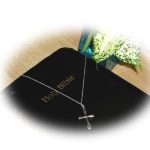From a sermon series on 1 Kings by See Huang Lim, a missionary at IBF.
Have you ever heard of fake noodles? According to a video I watched, some people in an Asian country found a way to make imitation beef noodles, including fake meat. By adding water and sauce to a powdery substance, the result looks and tastes like real meat. People sell this fake food because the ingredients are cheaper and they can make more money. A lab test showed that eating this fake food can cause cancer and other problems. The scary thing is that customers don’t realize it’s fake!
I was reminded of this video while preparing today’s sermon on false religions.
False religions teach what appears to be true but isn’t. Three points I want to make today are:
- False religions contain elements of truth.
- We must distinguish what is true.
- True security is only found in God.
[Read 1 Kings 12:25-33]
False religions contain elements of truth
First, let’s recall what happened before this. God had split the 12 tribes of Israel into two groups: two tribes ruled by King Rehoboam, and ten tribes controlled by Jeroboam, the main character of today’s story.
Jeroboam was afraid the ten tribes wouldn’t stay loyal to him. Since religion was a central part of Israelite culture, Jeroboam used religion to stay in control.
First, he created imitation gods so that the ten tribes wouldn’t need to go back to the temple in Jerusalem, which was controlled by King Rehoboam. He offered sacrifices to these golden idols. He also made shrines and a new religious festival, and he appointed priests who weren’t from the proper tribe of priests. All of it was an imitation of the worship of the One True God.
Verse 30 says, “And this thing became a sin; the people went even as far as Dan to worship the golden calf there.”
Why did the people accept Bethel and Dan as new places of worship? Bethel and Dan already had historical and religious significance. Bethel was where their ancestors Abraham and Jacob worshipped God. Meanwhile, Dan was where a descendant of Moses served as a priest.
The big problem is that, now, they weren’t worshiping the true God but a pair of golden statues.
Actually, the impulse to worship man-made idols is nothing new. Even wise king Solomon tolerated the idol worship of his foreign wives. For centuries, Israel had been surrounded by neighboring cultures who worshiped idols.
Maybe the people had forgotten God’s words In Exodus 20:2, God commanded them, “You shall no other gods before me.” Either they forgot, or they didn’t care.
Maybe they simply wanted independence from the rule of King Rehoboam, whom they believed might rule them cruelly like the Egyptians once did. Could that be why Jeroboam chose golden calves? Because that would remind them of Egypt? Long ago, when Israel escaped from slavery in Egypt under Moses’ guidance, they got impatient while waiting to hear from God. They built a golden calf to pray to. They said, “Here are your gods, O Israel, who brought you up out of Egypt.” (1 Kings 12:28; Exodus 32:4) Jeroboam’s words mirror the old Israelites’ words at that time.
You may wonder why the Israelites were so willing to accept this fake religion. Well, maybe because it looked similar enough to their previous religion.
Perhaps the Israelites had lost touch with everything God had said to them and done for them in the past. So they failed to recognize what was true.
This can happen to people today as well. After all, false religions contain many elements of truth and goodness. That’s what makes them appealing.
We must be able to distinguish what is true
So we must be able to distinguish what is true from what is not.
Some cults of Christianity appeal to true historical events and good moral teachings. But they mix it beliefs which are untrue. For example, the Mormon cult believes in Jesus, who died for their sins. But they also believe that Jesus was born from a sexual relationship between God and Mary. And that Jesus married multiple wives. Here in Japan, many people think that Mormons and Jehovah Witnesses are Christians. They don’t know that these are cults.
Here are 3 ways we can distinguish cults from true Christianity.
First, cults add to Scripture. Besides the Bible, they have additional scriptures or their own translation of the Bible. For example, Mormons have the “Book of Mormon” and Jehovah Witnesses have the “New World Translation.” Cults believe their additional scriptures are equal to the Bible or higher than the Bible.
Meanwhile, other cults may not have additional scriptures. But they pick Bible verses and read them out of context, to support their warped theology.
Second, cults subtract from the person of Christ. For example, by saying Jesus Christ is not truly God.
Third, cults change the requirements for salvation. For example, Mormons believe you need to marry and have many children to be saved. Jehovah Witnesses say that 50% of your salvation comes from Christ’s death and 50% from your own good deeds.
So, it is critical for us to be familiar with what God has revealed to us already in the Bible. To please God and to live rightly, we must know His words and His heart.
The words of Paul in 2 Timothy are a good reminder:
“In fact, everyone who wants to live a godly life in Christ Jesus will be persecuted, while evil men and imposters will go from bad to worse, deceiving and being deceived. But as for you, continue in what you have learned and have become convinced of, because you know those from whom you learned it, and how from infancy you have known the holy Scriptures, which are able to make you wise for salvation in Christ Jesus. All Scripture is God-breathed and is useful for teaching, rebuking, correcting, and training in righteousness, so that the man of God may be thoroughly equipped for every good work.” (2 Timothy 3:12-16)
“For the time will come when men will not put up with sound doctrine. Instead, to suit their own desires, they will gather around them a great number of teachers to say what their itching ears want to hear. They will turn their ears away from the truth and turn aside to myths.” (2 Timothy 4:3-4)
So Paul warns us to live by Scripture, rather than by whatever suits our own desires. That is why we learn about Scripture in church, from other Christians, and from our own reading at home.
True security is only found in God
Before I conclude, let’s go back to Jeroboam and ask, “Why did he make his own religion?”
After all, God had already promised to give him the 10 tribes. Let’s review God’s promise in 1 Kings 11.
1 Kings 11:31 records God’s word to Jeroboam: “See, I am going to tear the kingdom out of Solomon’s hand and give you ten tribes.” Verse 37 says, “You will rule over all that your heart desires; you will be king over Israel. If you do whatever I command you and walk in my ways and do what is right in my eyes by keeping my statutes and commands, as David my servant did, I will be with you.”
In other words, God said: Jeroboam, if you obey me and do what is right, you will rule over Israel and I will help you.
But God’s promise wasn’t enough for Jeroboam. He was overcome by fear that the people would abandon him. He might lose control and even be killed.
His solution was to control the people through his own efforts, rather than believe in God’s power. Unfortunately, his solution only angered God, as we will see later in Chapter 13.
Jeroboam’s mistake was seeking security in religion, politics, and manipulation. He relied on himself.
Sometimes we are like Jeroboam. We get worried over a big problem and we don’t truly believe God will help us. We try to tackle the problem by ourselves and it gets worse. Or, sometimes we solve the problem but we ourselves grow further away from God.
Or, there is something in life we are trying to achieve or hold on to. We think life will be better if we just have this thing. Or life will miserable if we do not have this thing.
Can we let God be enough for us? Can we let God be our security and fulfilment?
In the Bible, God promises us a security that is eternal. Even if we die, we will have life that never ends. And that life will be in His loving presence. Meanwhile, while on earth, we receive God’s forgiveness. We receive God’s Spirit, who guides us and changes us. We learn our true value and the purpose of our existence. These are the gifts Jesus came to give us.
True security is only found in God, through Jesus.
As Jesus says in, John 10:27: “My sheep listen to my voice; I know them, and they follow me. I give them eternal life, and they shall never perish; no one will snatch them out of my hand. My Father, who has given them to me, is greater than all; no one can snatch them out of my Father’s hand.”
Conclusion
In conclusion, Jeroboam’s story is a warning that false religions can deceive those who are not careful. False religions are born from a mixture of truth and falsehood. They result from man’s efforts to find his own way in life. May God help us distinguish what is true and find true security in Him.


